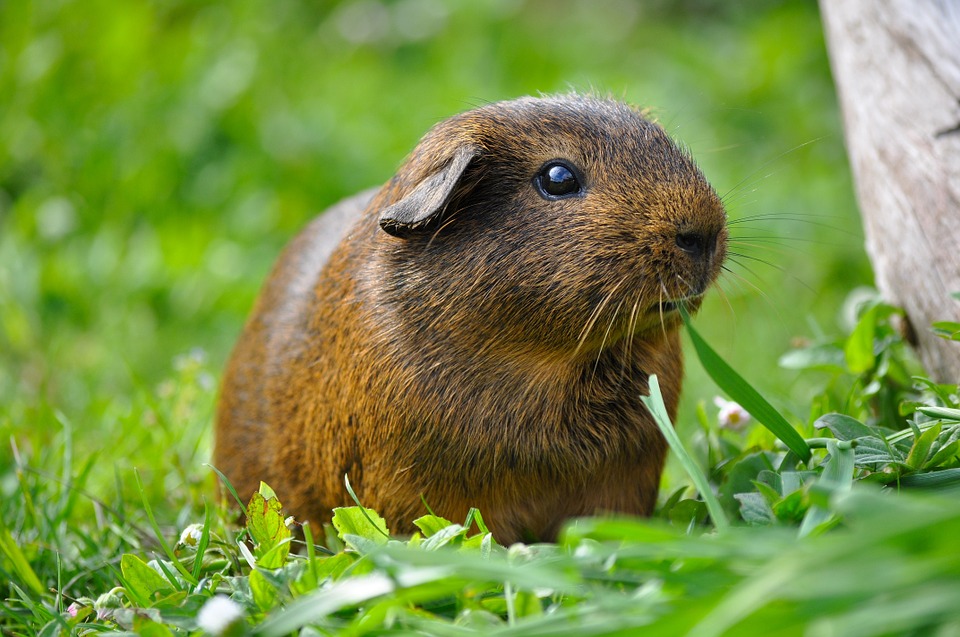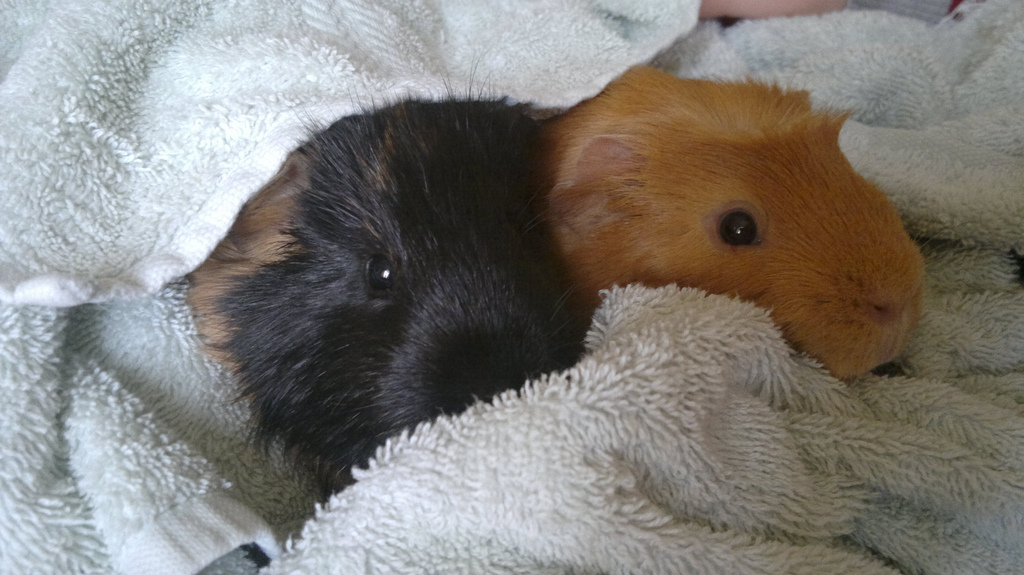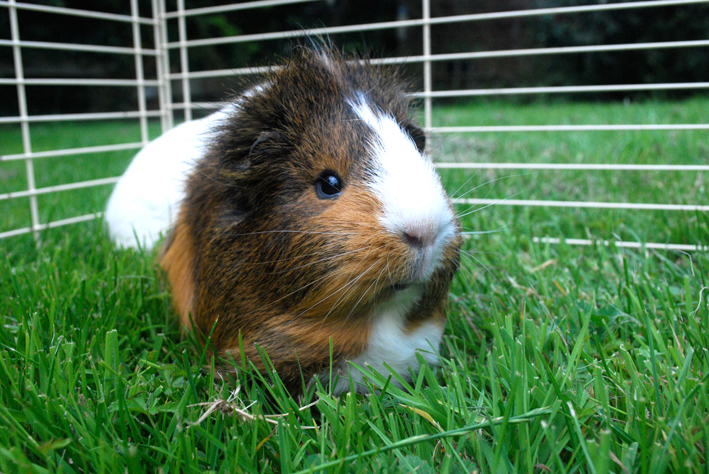
This article will walk you through the human food guinea pigs can eat and will point out some of the foods that can be poisonous to your pet as well. Guinea pigs are primarily herbivores and are considered to be grazing animals. They have been known to chew or attempt to eat anything including plastic, fabric, wiring, and other non-edible items that can hurt them so be sure to watch them carefully if they are loose in your home for play time.
What Human Food Can Guinea Pigs Eat?
If you’re wondering what human food guinea pigs can eat, the answer is not cut and dried. While fruits and vegetables for the most part are good for humans, this is not necessarily true for guinea pigs. There are a lot of different fruits and vegetables that guinea pigs can eat safely as long as they are fed in moderation but there are also some foods that can be harmful if you feed them to your guinea pigs too often.
Even though they can be a favorite for humans, guinea pigs should not be fed meat, breads, pastries, or dairy foods. Just because we included a specific human food on the lists below doesn’t mean it’s safe for your guinea pig to eat as much as they want to eat. There are also some foods that can be toxic for guinea pigs which means you should avoid feeding them to your guinea pigs at all costs.
Remember that like humans, guinea pigs can have unique reactions to food even if it’s been deemed safe for most guinea pigs to eat. Please do your research or consult your vet before adding any new food to the diet of your guinea pigs and get your guinea pig in for a checkup by your vet if you notice any unusual symptoms or behaviors after feeding them a new food.
Some of the human food guinea pigs can eat include:
- Carrots
- Peppers
- Cabbage
- Chicory (greens)
- Collards
- Endive
- Cucumber
- Green beans
- Kohlrabi
- Kale
- Corn
- Spinach
- Lettuce (romaine, red leaf, and butterhead, radicchio)
- Zucchini
- Squash (winter, summer)
- Okra
- Parsley
- Watercress
- Turnip greens
- Sweet Potato Leaves
Get the best and most affordable supplies for your guinea pig using CPE verified provider Budget Pet Care.
What Kind of Fruit Do Guinea Pigs Eat?
We all know that fruit is healthy for humans but what about your guinea pigs? The good news is that many of the same fruits that you eat can actually be a scrumptious treat to delight your guinea pigs. The not so good news is that most of those refreshing fruits that we love so much are going to be too high in sugar content for your guinea pigs to eat regularly.
The general rule of thumb for feeding fruits to your guinea pigs is to feed safe fruits in moderation, once or twice weekly, along with their regular diet of pellets, timothy hay, and fresh water. Keep in mind that if you choose to feed your guinea pigs apples or pears, you can leave the peels on if you are certain the fruit was not sprayed with chemicals but remove the seeds to prevent the possibility of choking.
Some Fruits Guinea Pigs Eat:
- Blueberries
- Raspberry plant leaves
- Papaya
- Peach, Pears, Nectarines, Plum
- Starfruit
- Strawberries
- Watermelon rind
- Kiwi
What Can’t Guinea Pigs Eat?

We’ve talked about all the food that guinea pigs can eat and the list is extensive as long as you feed in moderation. But the bad news is that just because your guinea pig will eat just about any kind of food, doesn’t mean that all foods are good for them. In the same respect, just because you give your guinea pig a new piece of food and he doesn’t show any type of negative reaction, doesn’t mean it’s healthy for your guinea pig to keep eating that food.
For the most part, the foods we’ve talked about as safe for guinea pigs are in fact safe if you follow recommendations and watch your guinea pig carefully for signs of distress. But remember even foods that are deemed “guinea pig safe” can cause a reaction in some guinea pigs.
Below is a list of foods that guinea pigs can’t eat. These foods should be avoided at all costs:
- Avocado is too high in fat
- Cakes, cookies, pastries
- Beans
- Cherry trees
- Chiles
- Coconut too high in fat
- Coffee, soda (caffeine, sugar)
- Dairy foods
- Garlic
- Iceberg lettuce
- Juice
- Meat
- Nuts
- Paprika
- Olives
- Hot peppers
- Potatoes (especially those that are green or have sprouted)
- Raw beans
- Sweet pea
- Tomato leaves, tops, and stalk are poisonous
- Bread
- Seeds (remove them from foods such as apples, pears, pumpkin, peppers, etc.)
Poisonous foods for guinea pigs

If you’re going to take good care of your guinea pig, you’ll need to memorize these foods that are highly toxic for guinea pigs. Poisonous foods include: Rhubarb, mushrooms, garlic, bishop’s weed, potatoes (green or sprouted), tomatillo or tomato, olives. Avoid feeding any of these foods to your guinea pig or results can be fatal.
Out in the wild or in the garden, there are also plants to be wary of to ensure your guinea pigs don’t eat them, including daffodil, buttercup, black locust, autumn crocus, larkspur, elephant ear, foxglove, glory lily, annual poinsettia, English ivy, iris, jasmine, lily of the valley, mistletoe, laurels, mushrooms, and pine needles.
What Do Guinea Pigs Eat in the Wild?
A longtime favorite domestic pet, guinea pigs originated from South America. The species is not known to still exist in the wild other than perhaps the occasional pets that have gotten loose outside. Suffice it to say that if your guinea pig were to get loose outside, he wouldn’t starve unless perhaps it was winter time in a colder climate. Guinea pigs in the wild do not feed strictly on plants but since they are grazing animals, they do need to spend a good portion of each day eating.
If you’re wondering what guinea pigs eat in the wild, most of their diet will consist of grass, plants, occasional seeds, and leaves. For the most part, guinea pigs will instinctively know what plants to stay away from because they are toxic. Guinea pigs in the wild will eat seeds that could potentially choke them and they may tend to eat too much of things they love and simply suffer through the digestive issues because they don’t know any better.
Guinea pigs forage most at night, so if your pet does get loose outside, try watching for him at night in the backyard as opposed to searching in the daytime. You can also try placing some of his favorite fruits and veggies and a good supply of grass hay in his cage near your door or porch. Leave the cage door open. When he comes out at night to forage, he may smell the treats and wander on his own into his cage.
Other Foods Guinea Pigs Can Eat
Okay so we’ve talked about the human food that guinea pigs can eat, so to wrap it up, we’ll talk a little about other types of foods guinea pigs can eat. It’s very important for guinea pigs to have access to balanced minerals, vitamins, protein, and other nutrients at all times. This means instead of feeding your guinea pigs morning and night, like you do for a dog, you need to make certain your guinea pigs have a continuous supply of food.
A healthy diet for your guinea pig consists of the following components:
Water
Fresh, clean water for your guinea pigs around the clock is essential to their good health. Do not use distilled water as essential vitamins and minerals are missing. If you use well water for guinea pigs, it should be okay if it has been tested and determined to be safe for human consumption. Avoid using water that could be contaminated or water high in chlorine or heavy metals. Bottle spring water or bottle water with no flavoring added is recommended.
Pellets
Part of your guinea pigs daily diet should also include pellets. These should be made for guinea pigs. Although rabbit pellets may look similar, they are not the same and can be harmful to your guinea pig. Guinea pigs should be fed a quarter to an eighth cup of pellets daily. Feed fresh pellets, preferably those made with Vitamin C, and not pellets that have animal byproducts or corn as the main ingredient.
Hay
Unlike cats, dogs, or many other domestic animals, guinea pigs are categorized as grazing animals. This puts them more in the category of goats and cows when it comes to their diets which is the reason why guinea pigs should have unlimited access to hay. The age and health of your pet will determine the type of hay that you should feed.
Unless your vet recommends otherwise, give your guinea pigs access to fresh, clean grass hay around the clock. For young guinea pigs (less than one year old), a guinea pig that is pregnant, or for those guinea pigs that are sick and a vet recommends it, you can also feed alfalfa hay.
Now you have a better idea of what human food your guinea pig can eat in moderation as well as what to feed them on a daily basis to keep them healthy and happy. If in doubt, or if your guinea pig shows any unusual behaviors, stop all human food and consult your veterinarian.